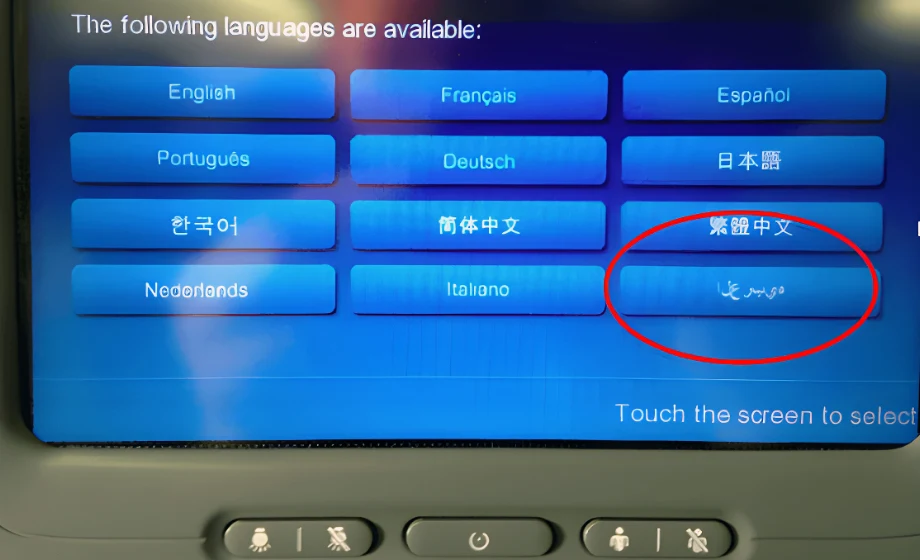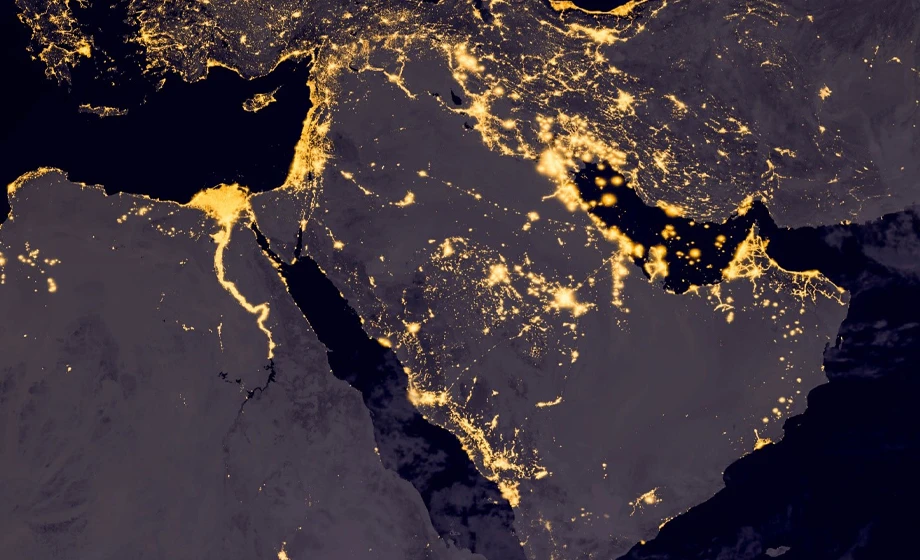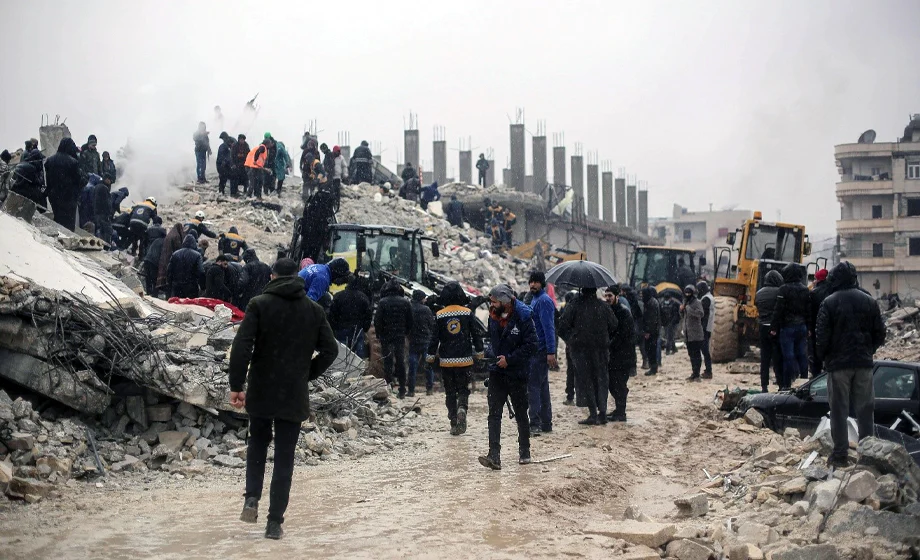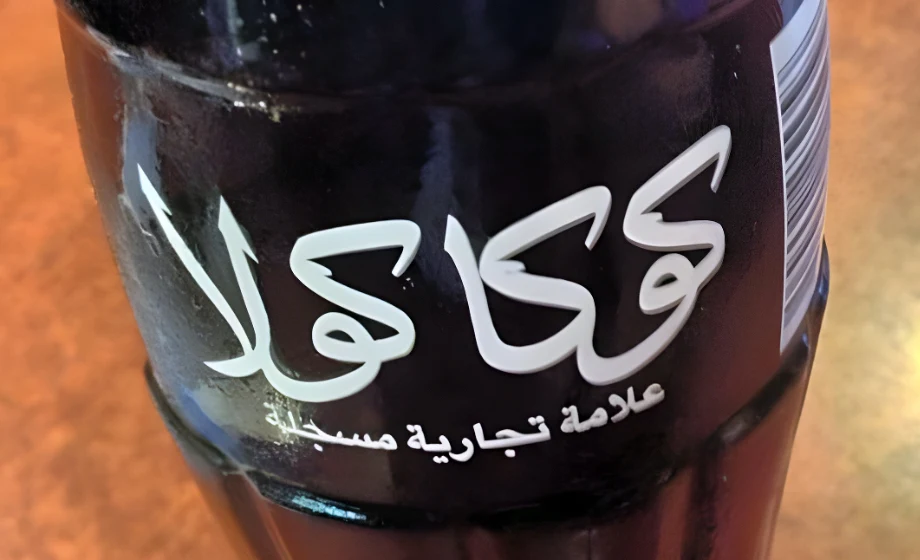“Can’t we just use Google Translate?”
These words are music to the ears of any experienced translator.
Why?
They know they are about to get a client for life once this person gets humiliated when someone points out the glaring errors in their computer-translated masterpiece.
Yes, machine translation still has a way to go. This is especially the case when translating between two languages from different language families, such as Arabic and English.
At the end of the day, you are likely to spend more time and money fixing a machine’s errors than if you had used a professional human translator. And that’s before you factor in the reputational costs of putting an embarrassing mistranslation in front of your audience.
Still don’t believe me?
We’ve spent years collecting the most hilarious Arabic translation fails we can find.
And while human error is the root cause of some of these, the issue is typically a machine’s failure to select the right word for the document’s context.
So enjoy!
These are just a small sampling of the translation fails we’ve seen over the years. If you have one to contribute, be sure to contact us here.
1. “Climb the chicken”
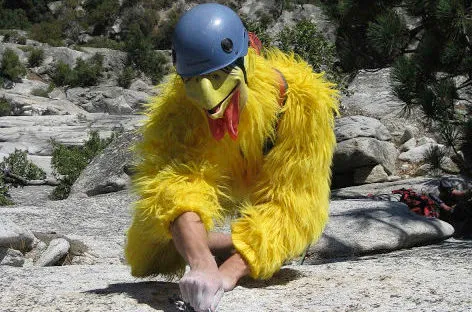
One of the recipes in the cookbook that I worked on as a lecturer at Amman Applied University College of Tourism and Hospitality was run through Google Translate by the kitchen staff before it arrived in my inbox. In the directions, this caught my eye: “Climb the chicken.” I soon realized that the original Arabic contained the verb “تسلق” or ‘تَسْلُق’ (tasluqq) which the automatic translation misread as ‘تَسَلُّق’ (tasalluq) or ‘to climb’.
2. Most misogynist hotel reception desk ever…
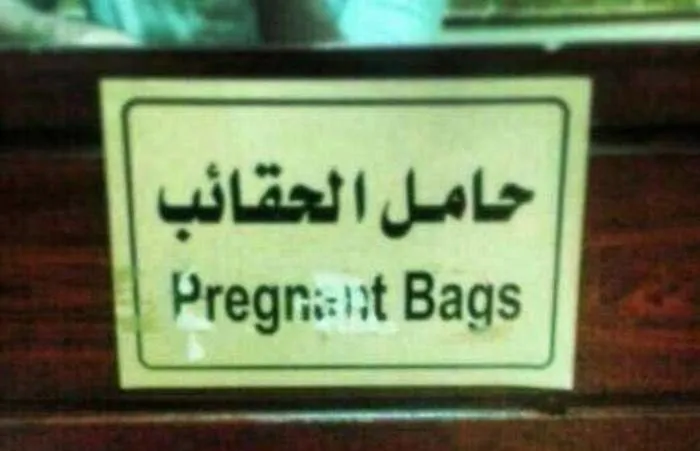
I’m sure it was an honest mistake on the computer’s part, especially since the term حامل (Haamel) does mean “pregnant” when talking of a woman who is carrying a child. However, in general, the word means “carrier,” or in this case, a “porter” (bag carrier).
3. A very problematic menu, if you ask me…
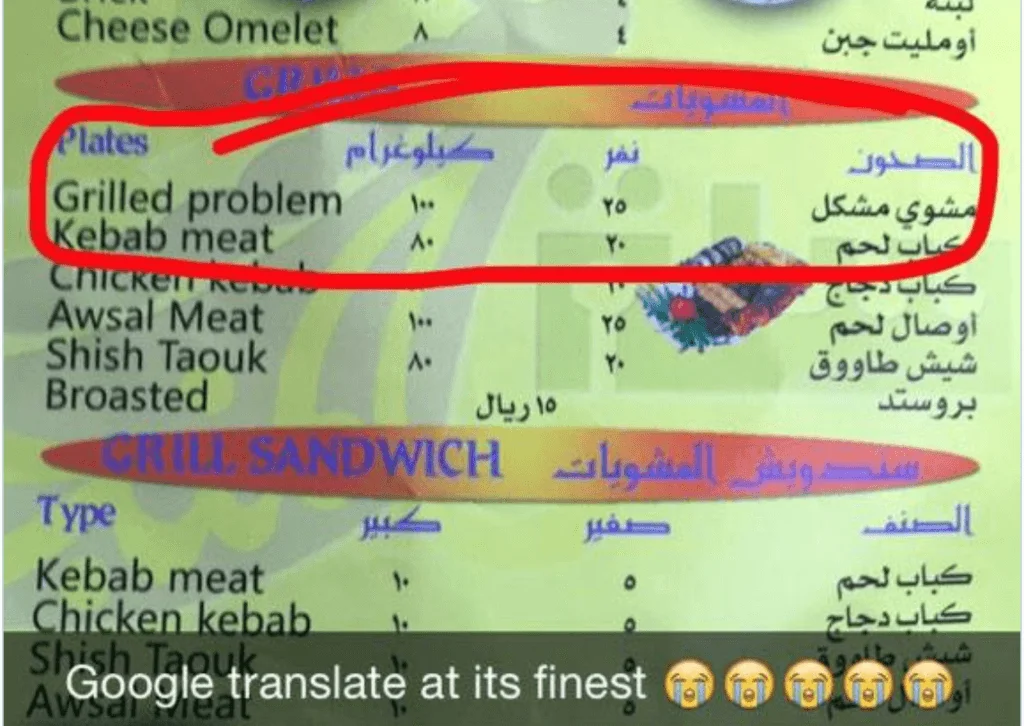
I’m sure there’s nothing wrong with the falafel or grilled meats, aside from their translations. In this case, the term مُشَكَّل (mushakkal), which means “mixed” (as in “mixed falafel/meat dish”), was misread as مُشكِلة (mushkila), which means “problem.”
4.”I love eating my namesake!”
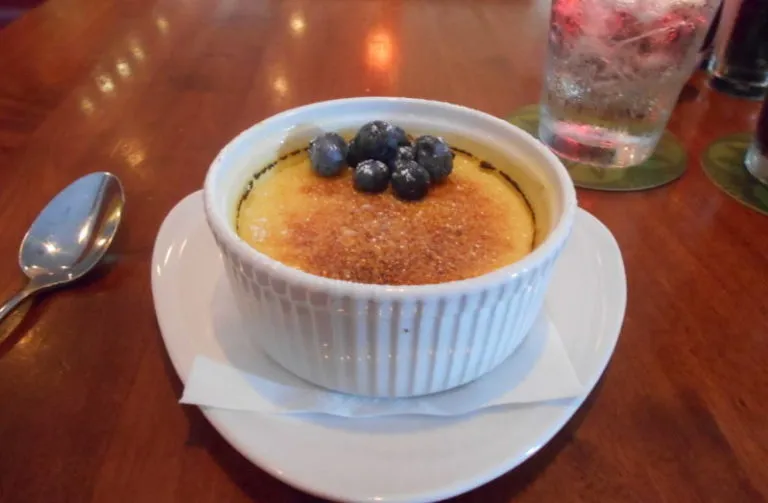
I once was reading a story that dealt with a girl named كريمة المحروقي (Karima al-Mahrouqi) and the machine translated her name as “crème brûlée”. “Crème brûlée” is a famous French dessert that means “burnt cream.” With this is mind, the computer’s mistake seems more forgivable. As it couldn’t identify this phrase as a name, it tried to make sense of the two words without any context. The word كريمة (creema) is sometimes used in Arabic for “cream,” while المحروقي (Al-Mahrouqi) was misinterpreted as المحروق (al-maHruuq), which means “the burnt”.
5. Even I wouldn’t eat that!
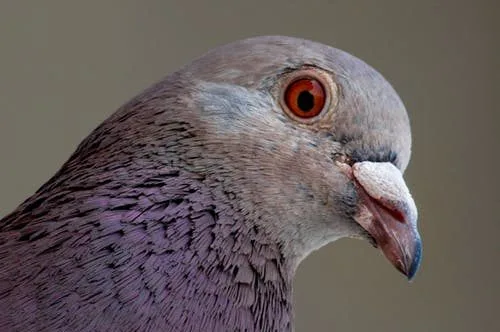
In the last three years, I helped a Dubai-based company that provided translation and proofreading services for a variety of clients, including top hotels and restaurants in the UAE. One menu translation we got from our clients for revision stated the following: شوربة حمام = bathroom soup.”
This is one of the most common mistranslations, especially for new learners and robots. It has to do with the fact that the word for both “bathroom” and “pigeon” have the same structure (حمام). However, one tiny diacritic distinguishes the two from another. The shadda is a pronunciation marker that hovers over a consonant that needs to emphasize. In this case, حمّام (Hammaam) means bathroom, while حمام (Hamaam) means “pigeon.” So, one tiny mark makes all the difference in this translation between a fowl recipe and a foul recipe!
6. I can only wonder what those fragrances smell like…

This is another instance where the machine could not recognize the first word of the sign (أنس) as the common male name “Anas.” Thus, instead of attracting potential tourists, this slip-shod translation will probably have customers holding their noses as they walk by its storefront.
7. “Sorry, we thought you were wishing us a happy holiday!”

While I was reviewing a TV episode’s subtitles, I was really surprised to see that an experienced translator translated ‘mayday,’ which should be translated as الاستغاثة (to call for help) or المساعدة (help), to يوم العمال, translating it literally as Labor Day (May 1st), also known as ‘May Day.’ He must have used Google Translate or something. It was the strangest and funniest translation I have ever seen.”
8. So that’s why fish smells so bad…
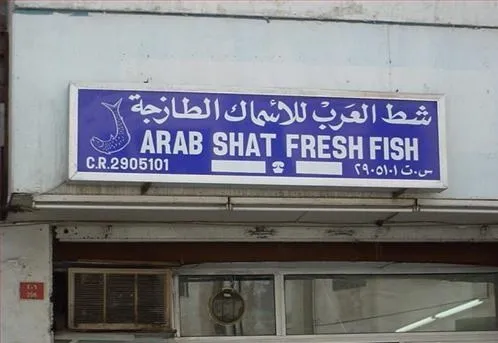
Just another example of AI’s lack of context producing a wonderfully cringe-worthy translation! In this case, it could not pick up on the fact that the first two words of the sign شط العرب (shaTT al-‘arab) are actually the name of an Iraqi city, Shatt al-Arab.
9. All Hail the Fail!
In this case, the restaurant transliterated “milkshake” into Arabic as مِلك شَك, but the machine translation read it as مَلِك شَك (malik shek), or “King Doubt.” Now I guess we know who the Dairy Queen’s husband is after all!
10. “You should duck and cover your head, in shame!”

The funniest mistranslation I came across was while watching Bridge of Spies on an Arab TV channel. They translated the phrase ‘if you duck and cover..’ to ‘إذا كنت بطة وتغطيت’ (literally meaning: if you were a duck and you covered up).”
11. What…just, no…
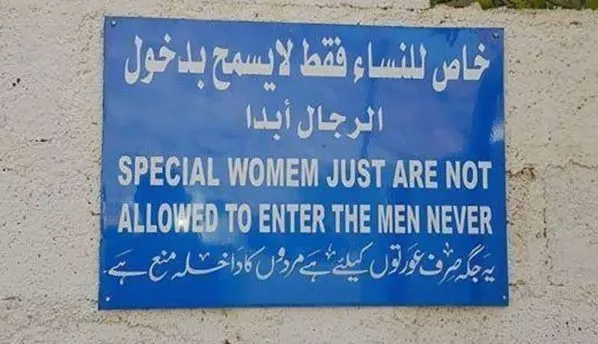
This is one of those rare instances where, even though it appears to have created a grammatically correct sentence, the machine still couldn’t make any sense. What probably tripped up the AI was the lack of punctuation that might have clarified the sentence, something a human would have naturally intuited. Broken down into two parts, the meaning becomes apparent: “Only for women; Men are never allowed to enter.”
12. “Are you kidding me?

The funniest mistranslation was the one I encountered while proofreading a TV episode, where the machine translated “are you kidding me?” as “هل أنت طفل؟” (“Are you a kid?”).
13. Cheesy, to say the least…
The major shortcoming of tools like Google Translate is that they do not understand Arabic slang and dialect words. In Syrian Arabic, شِلَل (shilal) is often used as a term for “spooled yarn” or “braids.” As anyone can see from the picture, the correct translation should be “Syrian braided cheese.” However, the machine interpreted the term as the formal Arabic word شَلَل (shalal), which means paralysis. In this way, having a human translator who is familiar with some dialect conventions would have been extremely helpful for this unfortunate cheese-monger.
14. Even this guy isn’t impressed…

One funny translation I can recall appeared in the English translation of an Egyptian university’s website. The text was completely machine-translated, to the extent that one of the professor’s names was translated as “Professor Watermelon,” as his family name was بطيخ (Batiikh).
15. More scandalous and salacious menu options!
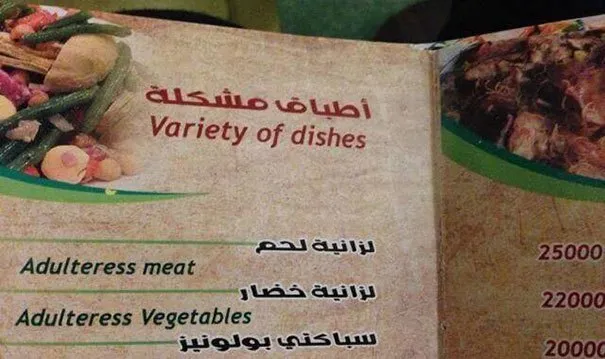
The tricky term here is لزانية, a transliteration of the word “lasagna.” Unfortunately, the computer only recognized زانية (zaaniyya) and translated it accordingly. Sometimes people feel guilty dining out, but I think this menu really goes a bit overboard!
16. These onions are making me cry for all the wrong reasons…
Now, this one is frustrating, since the client was clearly translating from English into Arabic, and should have caught this blatant error. The problem lies with the word يغادر (yughaadir), which means “leaves” in the verbal sense of exiting from a place, not the noun as intended. After reading this, methinks this grocer should leave behind his machine translation service!
17. “Wait, were those chips fat free…?”
I found the phrase ‘خالي من الدسم’ (fat-free) on the back of a bag of chips package translated as ‘my uncle from lipid,’ as خالي could mean both “free or void” and “my maternal uncle” depending on the context. How they managed to get THREE WORDS (including a preposition) wrong is unmatched in its own, beautifully horrendous way. This one will always be up there among the all-time worst translations in my book.
18. Poor Translations, now available in your grocer’s freezer aisle!
Seriously, what is with these supermarket robots? In this case, the machine translation rendered “waffles” as هراء (huraa’), which means “idle talk or prattle.” Thus, instead of finding their breakfast, Arab customers will likely be waffling about the store shelves in search of this tasty meal!
19. Talk about an emotional release!

In my previous job, I was helping a colleague translate an interview with a Syrian painter. I was proofreading my colleague’s translation when I saw the line “Painting makes me feel like I’m taking a declamatory dump.” That got my attention, so I checked the original Arabic. The painter said that art was a “تفريغ انفعالي”, or an “emotional release.” We both got a good laugh about it after we fixed it.
20. And the granddaddy of them all…
Apparently, this caterer is a hardcore beatles conspiracy theorist!
Image Credits
- https://climbingthecassin.blogspot.com/2010/10/chicken-storms-yosemite-this-is.html
- https://stepfeed.com/these-arabic-translation-fails-are-seriously-hilarious-7261
- https://www.pexels.com/photo/naked-baby-sitting-813616
- https://twitter.com/nhertwenties/status/573021368553381888
- https://www.pexels.com/photo/adult-bowl-brunette-eat-1153371
- https://www.pexels.com/photo/animal-animal-photography-avian-beak-625410
- https://www.thecairoscene.co/LifeStyle/Best-Arabic-Translation-Fails
- https://twitter.com/rachel63j/status/578954008053825537
- https://twitter.com/LibyaLiberty/status/902301582406115329
- https://pixabay.com/photos/kot-hundehaufen-funny-poop-2567407
- https://slydor.com/hilarious-translation-fails
- “Baby Colt 3” by xopherlance is licensed under CC BY-NC-ND 2.0
- “creme brulee” by Joelk75 is licensed under CC BY 2.0
